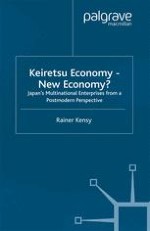2001 | OriginalPaper | Buchkapitel
Postmodern Indicators in Japanese Culture
verfasst von : Rainer Kensy
Erschienen in: Keiretsu Economy — New Economy?
Verlag: Palgrave Macmillan UK
Enthalten in: Professional Book Archive
Aktivieren Sie unsere intelligente Suche, um passende Fachinhalte oder Patente zu finden.
Wählen Sie Textabschnitte aus um mit Künstlicher Intelligenz passenden Patente zu finden. powered by
Markieren Sie Textabschnitte, um KI-gestützt weitere passende Inhalte zu finden. powered by
After presenting a general overview of research on Japan we now examine the country’s cultural aspects, taking into account its postmodern dimension, since this affects economic and social behaviour and economic structures to a far greater extent than in any other country. Because of its special features, it also contributes to the international success of ‘Japan Inc’. As already indicated in Chapter 1, section V, we now examine more closely the thesis that Japan’s culture and tradition have general characteristics which can, from a contemporary perspective, be labelled ‘postmodern’. In this argument, the theory that Japan has always been postmodern only serves to confuse. A more accurate formulation would be that some of Japan’s basic characteristics, developed during its history, are (again) now just as prevalent as prior to Japan’s modernization (during and after the Meiji period, i.e. from 1868), and today hold a special supportive position since they promote precisely the features considered essential for survival in the postmodern era.1 For this reason, it is dangerous to compare premodern, modern and postmodern in a Japanese context, since this would hypothesize a discrete temporal process, which would be inaccurate.2
